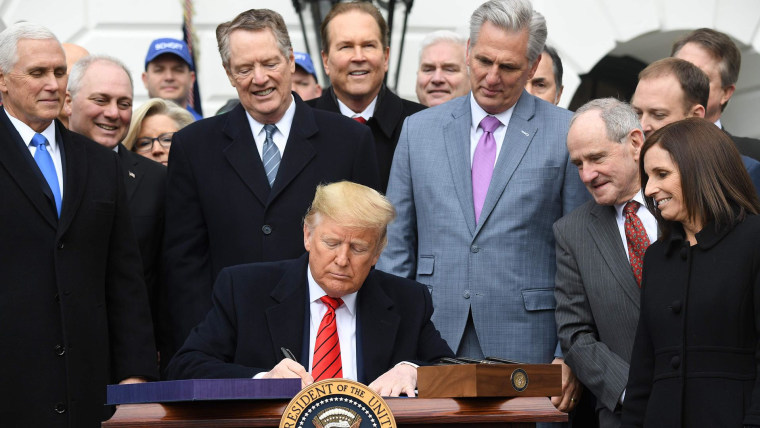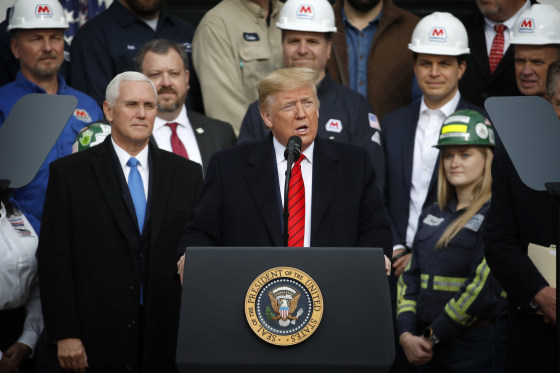With great fanfare — and without the presence of the Democratic congressional contingent that pushed for ratification — President Donald Trump signed the U.S.-Mexico-Canada Agreement on the South Lawn of the White House on Wednesday morning, with some 400 guests including farmers, CEOs and workers in attendance.
The deal is a reboot of the North American Free Trade Agreement that has governed trade between the United States and its neighbors since 1994. Although Trump has promoted USMCA as a wholesale overhaul that replaced the “NAFTA nightmare,” as he called it in his remarks Wednesday, trade experts said this characterization was inaccurate.

“USMCA is 95 percent the existing NAFTA agreement,” said Jacob Kirkegaard, a senior fellow at the Peterson Institute for International Economics. “There are provisions in there that cover things like e-commerce and digital services, but with regard to the manufacturing sector, for instance, there’s very little change.”
Trump claimed the deal will cost U.S. economic growth by 1.2 percent, but economists voiced skepticism. White House officials had previously estimated the economic boost at nearly 0.5 percent, which some also viewed as overblown. Mark Zandi, chief economist at Moody’s Analytics, described the new North American deal as a “tweak” to the original. “It’s more marketing there,” he said.
Trade economists say a few economic sectors will see an incremental boost. Higher automotive rules-of-origin requirements will increase the percentage of car parts that need to come from North America, and enhanced labor and environmental standards cut down on the financial incentives automakers have to make cars and car parts in Mexico, where labor costs are lower and environmental regulation more lax.
The deal expanded intellectual property protections and provisions for digital trade, a sector that has burgeoned since NAFTA was originally negotiated. USMCA also opens up the Canadian market to American dairy products, an element on which Trump focused when touting how the deal will benefit farm states.
"He didn’t get much, he got to rename it."
Zandi said the deal could provide a lift at the margins to the automotive and dairy industries, but would not generate the kinds of figures the White House has pushed, like $68 billion in new economic activity and 176,000 jobs.
“He didn’t get much, he got to rename it,” Kirkegaard said.
To the extent that Trump can claim credit for an economic lift provided by the USMCA, economists said that was more a function of the White House keeping most of the existing agreement in place after initially threatening to pull out of NAFTA entirely without a replacement in place.
“I would think of this more in terms of what would’ve happened if this agreement didn’t go back into place. That would’ve been disastrous for the economy,” said Dan North, chief economist at Euler Hermes North America.
Exiting NAFTA without replacing it would have forced the three nations to revert to WTO rules around trade, which would have upended supply chains and disrupted production throughout the continent.
“We have to view it as a bullet dodged, because the alternative would have been Trump pulling out of the whole thing, which would have been far worse,” Kirkegaard said. “He was threatening to overturn over the table.”
In this regard, trade experts drew parallels between Wednesday’s signing ceremony and the White House’s phase one China deal signed in Washington this month.
“The phase one trade deal with China will also have no macroeconomic impact, except forestall an escalation in the U.S. trade war with China, which would have likely pushed the global economy into recession,” Zandi said.
According to the nonpartisan Tax Foundation, the China tariffs already imposed shaved roughly a quarter of a percentage point off GDP growth, reduced wages and cost nearly 200,000 jobs. The threatened tariffs that were avoided when the China trade deal was struck would have doubled the hit to GDP.
“The key achievement of the USMCA was to keep the North-American trade system intact much as it was under NAFTA and ending a very destructive period of uncertainty,” said Peter Petri, a professor of international finance at the Brandeis International Business School.
“We are better off with these trade agreements than without them, because we ended costly uncertainties. But we are worse off in trade policy than three years ago,” he said.
